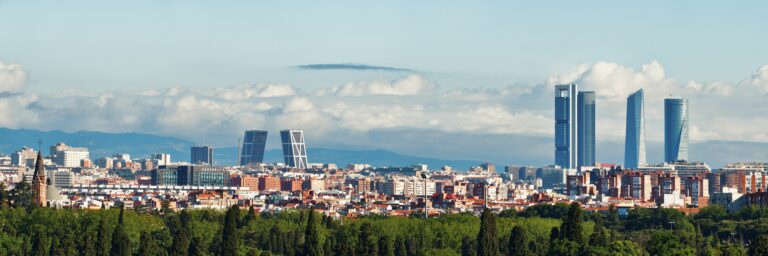InterRail Opens New Delegation Office in Spain
St. Gallen, 29 October 2024. As of October 1st, we’ve opened a new delegation office in Spain. This expansion is part of our ongoing commitment to extend our geographic presence in key markets across Europe and Asia.
Back in 2014, we launched our first full container train from China to Spain, covering one of the longest routes in China-Europe land transport. With our new office on the ground, we aim to strengthen our presence in Europe and respond even more directly to our customers’ needs.
The new InterRail delegation is led by Manuel J. Alvarez, and we had the chance to ask him a few questions about his role and plans for the region.

1. Could you briefly share your professional background and how it has prepared you for your role at InterRail?
I entered the world of logistics to solve a problem that my import-export business was suffering from. I learned first-hand about the links in the transport of goods and this led me to provide solutions to the rest of the companies that contacted me through the Chambers of Commerce.
With this experience I developed the implementation of Cacesa (air cargo subsidiary of the Iberia Group) at the León airport. As a result, Altius (Davila Group) became interested in me for the commercial development of the Forwarding division in the North West of Spain, interacting with the rest of the group’s offices. In the second phase, I developed the approach to markets such as the Balkans and Central Asia; and this is where I first came into contact with the Group.
And the third phase has been the award of the operation of the freight railway terminal at the Vigo-Guixar station attached to the Port of Vigo.
Although the environment has always been commercial, the common denominator of all the projects has been Business Development by managing teams.
2. From your perspective, what is the business potential for InterRail in Spain?
Our goal is to enter the Madrid >>> Europe (Germany, France, Benelux) flows through our partners and with our own equipment in the Spanish traffic: Madrid >>> Spain (come into the interconnectable network) and Barcelona >>> Seville.
We also want to position ourselves in the market as a reference in Central Asia, taking into account that we have our own structure and also operate in all the East & Westbound railway corridors. Our position in Turkey and India is also very important.
3. What are the main opportunities and challenges you see for InterRail in this market?
In a new project, I would say that the challenge is what will generate the opportunity.
The positioning of our own equipment and mainly the reefer equipment opens up all the opportunities in the field of fruit and frozen products. As a tangible opportunity, I would say that Spain is positioned for InterRail as a bridge between Latin America and Morocco and the entire InterRail structure. Many Spanish companies are established in these markets and InterRail can provide cross-trade solutions.
4. What will your main goals and responsibilities be over the next few months?
Promotion and participation in the strategic development of InterRail not only at the level of customers and suppliers, but also with public administrations, logistics forums, ports,
railway terminals and road transport companies.
5. How do you plan to build and expand relationships with partners and clients in Spain?
InterAct + InterModal = InterRail. We will develop strategic alliances with freight forwarders whose clients require solutions and we will make tailor-made solutions for high-volume clients. We come to contribute our know-how and make our experience available to the Spanish market.
Our definition includes collaboration between truck and train, as it could not be otherwise. And by joining the seafreight we will have the logistics trinomial.
Synergy: “the whole is more important than the sum of its parts”
6. What trends or developments in the logistics and railway sectors should InterRail be aware of in your region?
By positioning our own equipment, we must consider the management of railway terminals and intermodal warehouses, relying on local actors for the first and last mile
The current railway quota is around 4%. There is a commitment piloted through the Mercancias Plan 30, so the objective has been set to achieve a 10% railway quota by 2030. This is the first plan in many decades and both, the public administration and the private sector, are very clear that this is the way forward. Projects such as the Mediterranean Corridor are a must. The Trans-European network to which the Mediterranean Corridor will be linked will cover 3,500 km, which concentrates 54% of the inhabitants of Europe and represents 66% of the GDP of the EU.
Spain’s Economy: Europe’s Growth Engine
Spain leads Europe in economic growth, reaching around 2.3%. Key drivers include robust tourism, strong exports, and investments in digitalization and green energy. Despite challenges like private investment gaps and high public debt, structural reforms and a resilient labor market support continued expansion.
(Sources: Handelsblatt, Esade)
